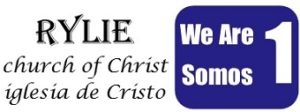Bulletin for 7-24-22
Birthdays and Anniversaries:
7-26 Tommy Reames
7-29 Luis & Wendi Camacho
Prayer requests:
Reames family, several members have covid. All improving.
Paul Tyler has a bad sort Parkinson’s. Please pray for him. His granddaughter, Michelle, scheduled for surgery
J R Medellin, Tiffany’s (Chance) husband, had a liver transplant last week. Home and doing well. Vanessea‘s surgery coming up.
Shirley Weeks, Steve’s mom, continues to have trouble.
Sarah, Chris Girvin’s sister, on hospice care
Robert and Sue Waller, health issues.
Darla Nitti, Wendi’s mom, not doing well.
Leta, has a recurring cancer, prayer request from her granddaughter via our website.
Tammy Jones, Weeks’ neighbor, kidney failure/dialysis
Campers and travelers. Several family members traveling this week
Sympathy:
Prayers for the Mauricio Ramirez family. He passed away earlier this week and services were held yesterday.
Also for the family of Darlyne Stewart, Karl Jones’s sister. Her services will be held August 1, 2 under direction of
Moore Funeral Home in Arlington. Please keep both families in your prayers.
Article
The Master Questioner
No person ever walked the earth with more knowledge. No person ever walked the earth with more to teach. And no person ever used questions more effectively than Jesus.
Reading through the Gospels, one might be struck by how infrequently Jesus answered questions with statements. Jesus was asked over 150 questions, and he directly answered fewer than 10. The rest he addressed indirectly, with questions, or with a combination of questions and statements.
Jesus was not being evasive, at least not in the derogatory sense. His questions were purposeful. Instead of force-feeding, Jesus gave those who heard him an opportunity to ponder and learn.
Often teachers merely impart answers, they inform with facts. Jesus led the willing to discover answers that would sink down deep inside. He invited them to ask, seek, and knock.
The questions Jesus asked fit the occasion. When honest seekers asked Jesus for information, Jesus led them in the right path.
“And his disciples answered him, ‘How can one feed these people with bread here in this desolate place?’ And he asked them, ‘How many loaves do you have’? They said, ‘Seven’” (Mark 8:4, 5 ESV).
Other questions resulted in a mild rebuke. When the sons of Zebedee desired to sit at the right hand and left hand of Jesus in his kingdom, Jesus responded with a question. “Are you able to drink the cup that I am to drink?” (Matthew 20:22).
Often Jesus was asked questions in a confrontational way. He almost always responded with questions, which if answered honestly would cause the accusers to condemn themselves.
When asked if it was lawful to heal on the Sabbath Jesus responded:
“Which one of you who has a sheep, if it falls into a pit on the Sabbath, will not take hold of it and lift it out? Of how much more value is a man than a sheep! So it is lawful to do good on the Sabbath” (Matthew 12:11-12).
Perhaps you can hear the pause that I hear as Jesus finishes the question. I see the men looking at each other, knowing that they would indeed rescue their sheep on the Sabbath. And then the hammer hits the nail, “Of how much more value is a man than a sheep!” The ESV places an exclamation mark, others a question mark (see KJV, MLV, LEB, YLT). Perhaps my favorite punctuation, the interrobang, would fit here. This is a exclamatory rhetorical question which leaves the interrogators with just one answer, “It is lawful to do good on the Sabbath.”
Jesus asked a question, then reasoned to a logical conclusion. The Lord used this same formula when asked about paying taxes. “Whose likeness and inscription is this?” he asked. “Caesar’s,” they answered. “Therefore, render to Caesar the things that are Caesar’s, and to God the things that are God’s” (Matthew 22:15-21). I think we can all see the power of this formula (see Matthew 22:22).
While Jesus would occasionally reason to a logical conclusion, other times his questions hung in the air, their answers obvious, but unspoken. Perhaps the most well-known of Jesus’ table-turning questions takes place in Jerusalem in the week leading up to the crucifixion. Jesus triumphantly entered Jerusalem, and then cleansed the temple. Upon returning to the temple, the Jewish leaders came up to him and asked, “By what authority are you doing these things, and who gave you this authority?” (Matthew 21:23).
Jesus answered their question with a conditional question.
“I also will ask you one question, and if you tell me the answer, then I also will tell you by what authority I do these things. The baptism of John, from where did it come? From heaven or from man?” (Matthew 21:24, 25a).
Jesus’ question placed these Jewish leaders on the horns of a dilemma. Either way they answered the consequences were dire. An honest heart would see and admit fault. This question revealed their dishonesty to all who heard, for after reasoning among themselves, they answered, “We do not know” (Matthew 21:27).
Though unspoken, Jesus’ question has a very clear answer. As a prophet, John’s baptism came from heaven. John testified that Jesus was the Lamb of God, sent from heaven. Therefore, Jesus’ authority came from heaven. Jesus’ question not only taught that profound truth, but it also exposed as hypocrites his accusers.
When used wisely, questions can defend the integrity of Scripture, help people discover truth, expose the weaknesses of an accusation, and lay bare the hearts of men.
When was the last time you answered a question with a question?
Lee Parish, link to original article
